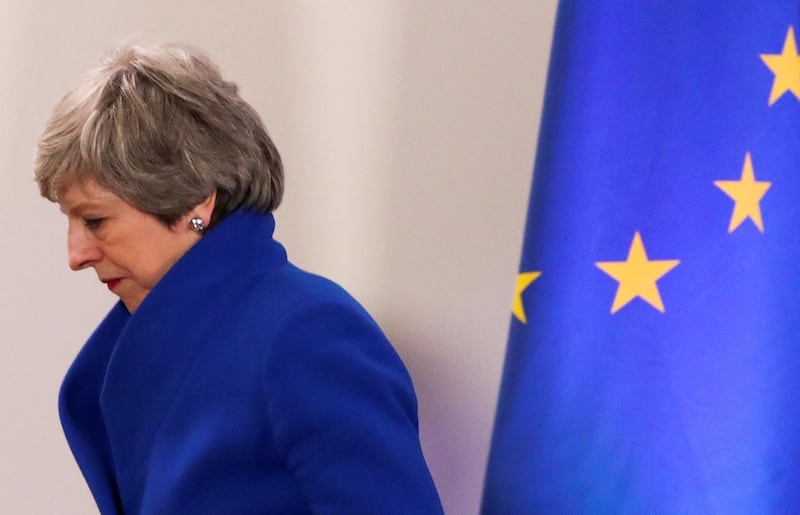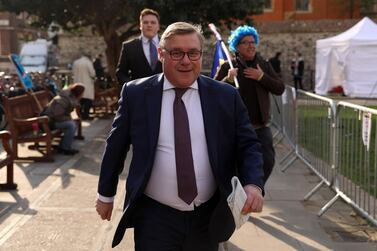UK premier Theresa May will attempt to plot a new way out of the European Union after securing a six-month extension to Brexit following marathon talks that ended the imminent threat of the UK crashing out of the bloc.
The deal struck in Brussels in the early hours of Thursday morning extends the deadline to the end of October and leaders urged the UK to get a move on to secure a deal that could be backed by parliament.
“Please do not waste this time,” said Donald Tusk, the head of the body that represents EU leaders.
Mrs May said it was now up to MPs to decide whether to accept a deal before May 22 or face taking part in European Parliament elections.
Updating MPs on her meeting with EU leaders, she said talks with the opposition Labour Party would continue to try and reach a Brexit compromise.
"It is incumbent on both front benches to seek to work together to deliver what the British people voted for," Mrs May told parliament on Thursday.
Opposition leader Jeremy Corbyn said the request for a second extension represented a "diplomatic failure" on behalf of the government but said Labour would continue to attend talks to find a consensus.
Business said the delay provided a “brief moment of relief” which would be followed swiftly by “frustration and exasperation” that no decision has yet been made.
“I’m afraid there will be no dancing in the streets around this,” said Carolyn Fairbairn, the head of the Confederation of British Industry (CBI).
In a pre-meeting letter to leaders, Mr Tusk said that that he was seeking up to a year’s extension but the longer delay was opposed by French leader Emmanuel Macron amid reported tensions between him and the German leader Angela Merkel.
Mr Macron said that he had pushed against a long extension "for the collective good".
"It is true that the majority was more in favour of a very long extension," he said. "But it was not logical in my view, and above all, it was neither good for us, nor for the British people."
The deal keeps all possibilities on the table including the possibility that no deal can be reached, a general election, a second referendum on the decision to leave, or abandoning Britain’s departure from the world’s largest trading bloc.
Mrs May has tried, and failed, three times to push the deal she struck with the EU through parliament.
The deadlock in parliament had already led to a delay from the initial departure date of March 29. Critics of Brexit urged the parliament to use the time to call for a second national vote on Brexit – a move the prime minister has repeatedly rejected.
But she faced fresh calls from some MPs from the hardline pro-Brexit wing of her party to step down amid anger over the delay, which means that the UK will have to play its part in EU elections.
Veteran Eurosceptic Sir Bill Cash described the extension as a "surrender" and asked the prime minister in parliament whether she would quit.
But pro-Remain Conservative Kenneth Clarke told Mrs May to ignore "vicious attacks" from their more right wing colleagues to resign and keep her promise to see through the Brexit process to the end.
The terms of the deal struck in Brussels in the early hours means that the UK could pull out of the world’s largest trading bloc before October if MPs can pass legislation.
After threats from Brexiteers to disrupt the EU in the event of an extension, the agreement to extend comes with a promise to honour "sincere co-operation".
"I think that the extension is long enough to get a deal through," Brexit Minister Kwasi Kwarteng told the BBC.
The extension keeps open the possibility that the EU can still crash out of the EU without a deal in place, an eventuality that only four per cent of companies were completely ready for, said the CBI. The deal agreed during the talks suggest that the EU also baulked at the prospect of a no-deal Brexit, which could lead to major disruption for travel and trade and a possible shortage of goods.
US President Donald Trump, who is embroiled in a trade dispute with the EU, tweeted that it was “too bad” that the EU was being “so tough” with the UK.
Irish Prime Minister Leo Varadkar said the time had come for Britain to decide what it wants.
"We're giving them a very long time to take a decision," he said. "You know, the European Union is not a prison. Nobody has to stay but it is also a home and we are not going to kick anyone out."






